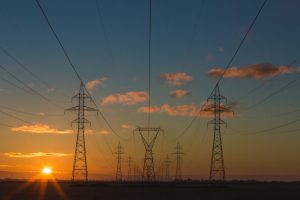Emissions continue rising fast as Governments fail to act:
After the pandemic caused a much needed fall in emissions last year, 2023 is projected to see the highest levels of carbon dioxide in the history of humanity, with even greater levels of pollution than the record set in 2018, as forecast this week by the International Energy Agency in July 2021.
Despite dipping their toe into the clean waters of zero-emission technologies the UK government look to be spectacularly on track for a massive case of way too little way too late.

Wild fires caused by climate change rage across huge swathes of California between Joshua Tree and Los Angeles
This means we can all forget the goals of the Paris climate agreement. Scientists have long warned that if the world is to limit global temperature rises to 1.5C then emissions must halve this decade. If not the effects of climate meltdown will devastate huge areas of the globe.
The reason behind the alarming increase is governments’ continued failure to invest meaningfully in green energy, such as the long talked about production of green hydrogen, despite vocal intentions to ‘build back greener’.
Energy Minister Anne-Marie Trevelyan officially opens UK hydrogen homes and fries eggs on zero-emission Hydrogen gas:
Energy Minister Anne-Marie Trevelyan has officially launched the UK’s first hydrogen powered zero-emission homes.
The houses have been built with funding from the government’s Hy4Heat innovation programme, Northern Gas Networks, and Cadent.

Energy Minister Anne-Marie Trevelyan cooks fried eggs in the UK’s first zero-emission hydrogen powered homes. The cooker she is using is powered by clean hydrogen.
The homes will be accessible to the public, including local schools, colleges and universities that are invited to learn more about the new technology.
“From running a hot bath and cooking our evening meals to turning on the heating, most of us use natural gas every day. However, to tackle climate change, we need to find alternatives to fossil fuels and move towards making clean energy the norm.
“While these new houses in Gateshead look like any other, they showcase how low carbon hydrogen can transform the way we power our homes and offer a glimpse of what the future holds as we build back greener.”
The Energy Minister then demonstrated the zero-emission hydrogen cooker by frying two delicious-looking eggs.
To support green hydrogen production in Scotland, BP & EnBW submit 2.9GW offshore wind lease bid:
BP in partnership with EnBW have made an ambitious bid for a 2.9GW offshore North Sea wind lease, that might create £10bn of investments to support production of green hydrogen.
The bid will support the production of green hydrogen whilst accelerating Scotland’s overall energy transition, that has already seen the country even look to decarbonise its legendary whiskey distilleries through the use of hydrogen.

The east coast of Scotland could become home to a massive offshore wind farm to supply energy for green hydrogen production through electrolysis, amongst other green initiatives.
The lease would be for an area off the east coast of Scotland that could generate 2.9GW of offshore wind.
BP’s plans for the project extend to an EV charging network and green hydrogen production plants (electrolysis).
If successful the bid is estimated to generate £10bn of investments into Scottish offshore wind projects and accompanying infrastructure such as shipyards, harbours, and ports.
With the new UK green transport laws, a greener grid is required, urgently:
The UK Government has announced its transport decarbonisation plan, to reduce the transport sector’s CO2 emissions to net-zero. The plan includes all transport modes: road, rail and aviation. The laws mean railway and aviation must hit the net-zero target by 2050, and roads a decade sooner by 2040.

The green transport system will require a multibillion-pound investment to rewire ageing power grids and fit huge amounts of electric-vehicle charging infrastructure.
But law is one thing, and executing it is another. These targets will require the UK to provide clean energy systems to power this brave new transport sector.
Carbon emissions from the UK’s energy industry have fallen in the last few years, mostly since closing coal burning power plants and replacing them with renewable energy sources.
However, senior energy industry sources are warning that and equally ambitious acceleration of these energy systems will be required if the UK’s ambitious reductions of the transport sector’s emissions are to be achieved.
The head of future markets at National Grid Graeme Cooper, said: “The energy industry has a huge role to play in facilitating the decarbonisation of transport.”
F1 could introduce hydrogen fuel, according to Ross Brawn:
Ross Brawn, F1’s MD, has ruled out the sport switching to fully electric cars.
He went on to clarify that the series might introduce hydrogen-powered cars in order to improve sustainability.

The MD of Formula One has confirmed the motorsport will not go all-electric, but is considering a switch to hydrogen fuel in an effort to reach net zero emissions by 2030.
Speaking to the BBC, Brawn repeated Formula One’s commitment to carbon neutrality by 2030.
Brawn told the BBC “We have a one-and-a-half-hour race, we have 1,000 horsepower cars, we are the pinnacle of motorsport. You can’t get that bang without fossil fuels.”
He continued: “Maybe hydrogen is the route that Formula One can have where we keep the noise, we keep the emotion but we move into a different solution.”
For more information about Ryze Hydrogen click here.






